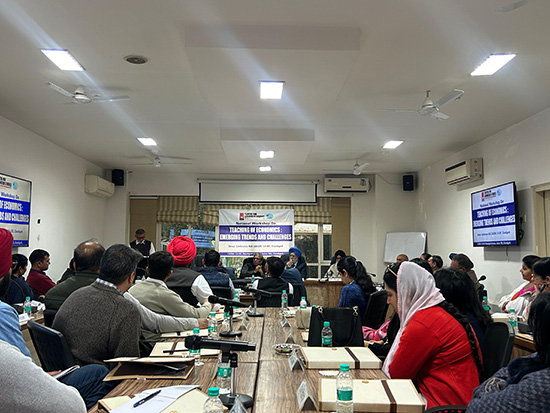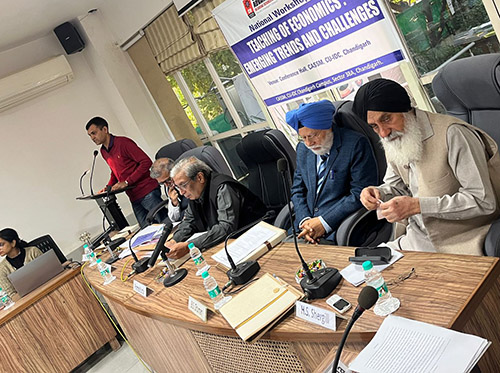Experts call for collective efforts to prepare students to address complex Global economic challenges effectively
Stressed on need to integrate economic theory with practical, data-driven, and interdisciplinary frameworks to prepare students for contemporary challenges.
National Workshop on “Teaching of Economics – Emerging Trends and Challenges”
Babushahi Bureau
Chandigarh, November 22, 2024:
Globalization, climate change, technological advancements, and public policy innovations are reshaping the discipline of economics. This was emphasized in the national workshop jointly organized by The Centre for Advanced Studies in Social Science and Management (CASSM) at the Institute for Development and Communication (IDC, Chandigarh) and Chandigarh University. The main theme of the workshop was “Teaching of Economics – Emerging Trends and Challenges.” The event brought together scholars, educators, and researchers to explore evolving approaches to teaching economics in light of pressing global issues.
It was argued that there was a need to integrate economic theory with practical, data-driven, and interdisciplinary frameworks to prepare students for contemporary challenges.
In his opening remarks, Dr. Varinder Sharma highlighted the institute’s commitment to fostering a humane society through research in governance, economic development, education, and gender justice. He introduced CASSM’s interdisciplinary MBA program designed to bridge academia, industry, and policy-making.
The reality of globalization has nurtured a new terrain for the trinity, i.e. the State, the market, and the civil society either to surrender or reinvent. It is not that the world was not globalized earlier. But now, the notion of globalization has given a new orthodoxy. These were the views expressed by Prof. Pramod Kumar. He further added that the nature, scale, scope and speed of the circulation of capital and commodities is unprecedented. This includes the speed of instant cash transfers, the speed of investments, the stock market, of general data collection. Another challenge is to make development process sustainable. Prof. Kumar reiterated that there is need to rethink about teaching economics which includes three elements, socially-just growth, redistributive sustainable development and productive engagement of citizens.

The need for balancing theoretical and practical skills, reducing reliance on advanced mathematical models with limited real-world relevance, and incorporating simpler, applicable frameworks to enhance employability, was stressed by Prof. H.S. Shergill. He further added that there was a need to update economics education to reflect shifts such as aging populations, migration, and environmental challenges.
Prof. Atul Sood advocated for pluralism and interdisciplinary perspectives in economics education. He highlighted the need to incorporate diverse methodologies and historical contexts, particularly to address issues like inequality, labor rights, and globalization. He further urged a shift away from abstract models to more human-centered approaches.
The paradigm shifts in economics education, emphasizing the limitations of traditional theories, such as the assumption of infinite resources was raised by Prof. Sunil Kumar Sinha. He highlighted the importance of critical thinking and introduced emerging fields like sustainable economics and the economics of regulation.

Prof. Manoj Bhatt defended the role of mathematics in economics for its precision and rigor. He stressed the importance of unbiased, data-driven research and integrating specialized branches like health and behavioral economics into economics curricula.
Modernizing economics education by integrating applied topics like sustainability, health economics, and gender budgeting was accentuated by Prof. N.S. Bisht. He stressed the importance of research skills, data analysis training, and exposing students to diverse economic theories. In his opinion, the focus should be on practical applications to enhance employability and address real-world challenges.
In conclusion, Prof. Ghuman summarized the workshop’s insights, emphasizing dynamic curriculum development, interdisciplinary approaches, and greater autonomy for educators to adapt to societal and market changes. The event concluded with a call for collective efforts to prepare students to address complex global economic challenges effectively.